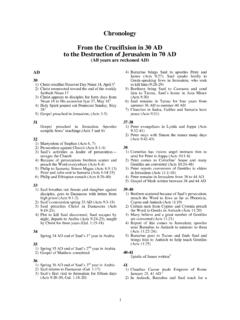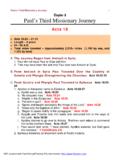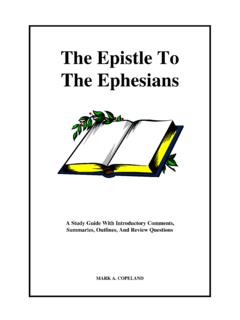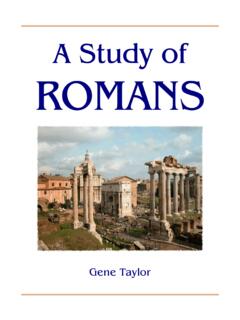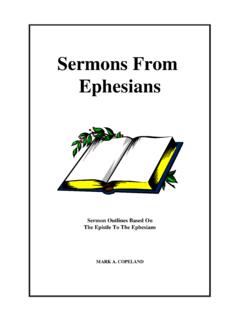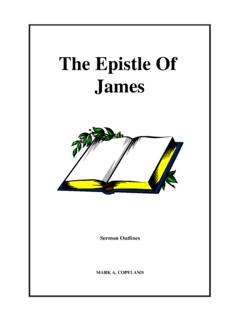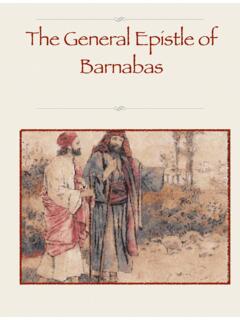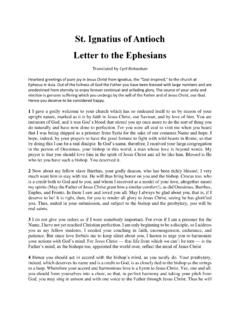Transcription of Martin Luther’s Preface to the Romans
1 Martin Luther sPreface to The epistle to the RomansNew Creation Publications Inc. Martin Luther s Preface to The epistle to the Romans This English translation is taken from the edition produced by Lutheran Publishing House, Adelaide, 1966. This edition first published 1995 by New Creation Publications Inc., Australia Reprinted 1997, 1998, 2001, 2003 National Library of Australia card number and ISBN 0 86408 188 X Wholly set and printed at NEW CREATION PUBLICATIONS INC. Coromandel East, South Australia vForeword Martin Luther died nearly 450 years ago but his writing still speaks to us.
2 He was awakened to the grace of God in Jesus Christ, and the effects of his renewal quickly spread through Germany. His testimony to justification through faith alone continues to spread around the world. In his longing for freedom of conscience, Luther was advised to read the Scriptures for himself. He did this, and lectured on it also. During 1515 he lectured on Romans , and, in the next two years, on Galatians. Somewhere in this time the passage, The just shall live by faith brought personal assurance to him that he was accepted by God through faith alone.
3 He wrote: I felt myself to be reborn and to have gone through open doors into paradise . By 1521 he was before an ecclesiastical court in Worms, to give an account of his beliefs. It was here that he made his now famous statement: Here I stand! I cannot do otherwise . An edict was pronounced against him, and, for safe keeping , he was spirited away by friends to Wartburg Castle where he stayed disguised as a knight and under an assumed name for nine months. During this time he translated the entire New Testament from Greek to German. He also wrote brief summaries, or prefaces, to each book similar to the Vulgate Bible.
4 This Luther Bible , and its Prefaces, were phrased in the language of the common people. vi The Preface which he wrote for Romans is longer than the others. It contains a summary of the whole letter and an outline of its doctrine. Its main terms are defined and related to each other. More particularly, it conveys the joy and power of the gospel so evident in paul s Letter to the Romans . Luther said about Romans : The more thoroughly it is treated, the more precious it becomes, and the better it tastes . This small document has had a wide and deep influence through its history.
5 The best known incident concerns John Wesley, who, in 1738, found his heart strangely warmed as he listened to this Preface being read. He was converted, and again, the world felt the power of God s forgiveness. May this booklet encourage many to read paul s letter and, particularly, to know the truth of God s grace. Grant Thorpe July, 1995 Martin Luther s Preface to the epistle to the Romans 1 Martin Luther s Preface to the epistle to the Romans Preface 1. This epistle is in truth the chief part of the New Testament and the purest Gospel. It would be quite proper for a Christian, not only to know it by heart word for word, but also to study it daily, for it is the soul s daily bread.
6 It can never be read or meditated too much and too well. The more thoroughly it is treated, the more precious it becomes, and the better it tastes. 2. Accordingly, I, too, shall offer my service and with the ability God has granted me prepare an introduction to it by this Preface in order that it may be better understood by everybody. For heretofore it has been miserably darkened by glosses and all sorts of twaddle, while in itself it is a shining light, quite sufficient to illumine the whole Scriptures. Part I. Explanation of Terms Used in This epistle 3.
7 In the first place, we must acquaint ourselves with matters of language and understand what paul means by these words: law, sin, grace, faith, righteousness, flesh, Spirit, and similar terms; otherwise we shall derive no benefit from reading this epistle . Martin Luther s Preface to the epistle to the Romans 2(a) Law 4. As regards the term law in this epistle , you must not understand it after the fashion of men, as denoting a doctrine that shows us what works we must, and what works we must not, do. That is the meaning of human laws, with which we comply when we do the works commanded, though our heart may have no share in them.
8 God frames His verdict in accordance with the condition of our inmost heart. His law, accordingly, makes demands upon our inmost heart, and is not satisfied with mere works, but brands as hypocrisy and lies all works in which our inmost heart has no share. For this reason all men are called liars, Psalm 116:11, because no one of them keeps, nor can keep, the Law of God from his inmost heart; everyone discovers in himself aversion to what is good and a desire for what is evil. Now, where there is no unconstrained desire for what is good, the inmost heart is not attached to the Law of God.
9 In such a case there is surely also sin and merited wrath of God, although to a superficial observer there may appear many good works and an upright life. 5. Hence paul concludes, chapter 2:12, 13, that the Jews are all sinners, and says that only the doers of the Law are justified in the sight of God. He means to say that no one is a doer of the Law by works. This is the way he speaks to them, v. 22: Thou sayest a man should not commit adultery, and thou committest adultery; likewise v. 1: Wherein thou judgest another thou condemnest thyself; for thou that judgest doest the same things.
10 As though he were to say: In public you are leading a good life in the works of the Law, and you are passing judgement on those who are not leading such a Martin Luther s Preface to the epistle to the Romans 3life. You know how to teach everybody; you behold the mote that is in your brother s eye, but do not consider the beam that is in your own eye. Matt. 7:3. The Law Demands Willing Obedience 6. For although you keep the Law outwardly by your works, from fear of punishment or love of reward, still you do everything without a free desire and love of the Law, with loathing and under restraint.
